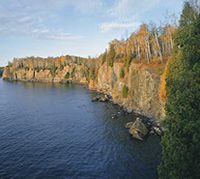What is more important? Jobs? Or the long-term integrity of our air and water and wild rice crops?
What more are we willing to sacrifice in terms of what we’re able to eat, drink and breathe in order to provide some – perhaps a lot – of short-term construction work – along with far fewer full time, permanent jobs?
That’s what makes projects like the PolyMet Copper-Nickel Mine project well north of the Twin Cities such a seductive venture. The mine would be dug smack in the middle of the Superior National Forest, in what is called the Duluth Complex – a relatively untapped lode of these metals – the Fond du Lac Indian Reservation.
At stake in this project are issues confronting all Minnesotans, not just those in the immediate vicinity of the mine itself – but its direct impact on the Fond du Lac Tribe of Lake Superior Chippewa – its economy and the safety of the waters thereabouts. These are wild-rice waters around there. We have other mines, yes, but this is the first rock containing sulfur, which, when exposed to air, water and bacteria, sulfur forms sulfuric acid. Not only can it drastically change the pH of a water system – from neutral or caustic to acidic – it tends to liberate heavy metals like mercury out of the rock and into the water.
So. What to do about this conundrum between one economy and another, between the millions of years of clean water and the likely changes that could probably kill everything living in it and the mining jobs so many people in that area believe are desperately needed – and will do anything, including leaving a questionable legacy of ecological disaster for the next generations in order to sustain their families and communities? What about the wild-rice growing and harvesting local Natives rely on for a major part of their living?
TTT’s ANDY DRISCOLL and MICHELLE ALIMORADI talk with those who are feeling slightly less powerful than the companies, politicians and state agencies backing the mine, including Winona LaDuke, who has been fighting the adulteration of wild rice paddies and the hybridization and commercial cultivation of wild rice for decades.
GUESTS:
WINONA LADUKE – White Earth Indian Reservation and Founder, White Earth Land Recovery Project
PAULA MACCABEE – Attorney, Water Legacy
BRUCE JOHNSON – Retired MPCA Staff and Northern Minnesota constituent
BOB TAMMEN – Retired Mine Worker
FMR SEN. JIM CARLSON – Author, SF 2349 (2010), providing for financial assurance for nonferrous metallic mineral mining
Thanks to Water Legacy activist, Diadra Decker, for advising and assisting this production.



